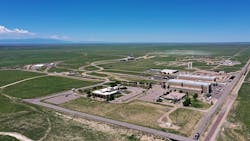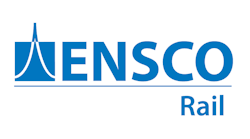Transportation Technology Center continues its evolution into innovation hub for rail and ground transportation
Transportation Technology Center (TTC) in Pueblo, Colo., has been the center of freight and passenger rail research for more than 50 years. The Federal Railroad Administration (FRA), which owns the facilities and assets, noted the work performed at the center during the past half century as having “contributed immensely to dramatic transportation safety improvements.”
The 52-square-mile facility is transitioning to a new operational contractor after FRA awarded a $571-million contract to ENSCO, Inc., in March 2021. ENSCO will be responsible for the research and development, testing, engineering and training services at TTC. The transition of TTC to ENSCO began in April 2022.
Division Manager of ENSCO Rail Matthew Dick explains the site is comparable to a small city and much of the current work is focused on transitioning things such as utilities, ground transportation vehicles, support services such as the fire department and other administrative elements to the organization.
As the awardee, ENSCO will operate and maintain the TTC in support of the U.S. Department of Transportation (USDOT) to develop a vibrant, engaging and modern TTC that fosters innovation, encourages positive change and creates opportunity. ENSCO will also expand the use of the facility to support other government and commercial entities to achieve the broader mission of transportation safety, security and innovation. Transition of the USDOT operations, maintenance and research programs to ENSCO will be completed by October 2022.
“Another major initiative for the site is cybersecurity, which ENSCO does quite a bit of work in with our other divisions. We have a large office in Colorado Springs with cybersecurity capabilities and we're already drawing those connections between their division and our surface transportation divisions to provide cybersecurity training to the transportation industry,” explained Dick.
Exploring automation opportunities will also fall under the wider umbrella of TTC capabilities.
“A major priority for transits and railways is to increase automation to improve operations to drive down costs and increase safety. I would invite the industry to consider the site as a great place to test advancements in automation whether its next generation train control systems, rolling stock, contract infrastructure assessment – it’s all on the table – and TTC is a great place to do this without interfering with revenue operations,” explained Dick.
Maximizing site utilization
ENSCO will be supported by a team of organizations it says is focused on next generation technology supporting transportation infrastructure. To complement the private sector partners will be the Center for Surface Transportation Testing and Academic Research (C-STTAR), which is a consortium of eight universities and academic research centers established by ENSCO to provide expertise in research focus areas across all modes of surface transportation. While Dick notes the importance of having C-STTAR involved in research, the consortium also offers a chance to bring students into the transportation industry.
“There’s a lot of great universities, including my alma mater, the University of Nebraska, that are involved in trespasser reduction, cybersecurity, roadside collision testing – a lot of great activities – and the site is ideal for crashworthiness testing,” explained Dick.
ENSCO’s contract with FRA includes a five-year base period and three, five-year option periods for a total of 20 years from award date. ENSCO’s priorities in the first five years are to continue the important railroad research occurring at the center today and to expand the capabilities of the site to other modes of transportation. ENSCO says it also looks forward to supporting the local Pueblo, Colo., economy by partnering with local leadership, universities and businesses, attracting visitors who participate in site activities and recruiting top technical talent to the area.
“I think what's really going to be the measure of success is seeing that the site is getting utilized and organizations are coming out and doing their testing and their research. The site's growing its capabilities, as well branching out more into other modes of surface transportation, but it still needs to ensure that the rail industry is being served with the site,” said Dick.
ENSCO is aware of the responsibility it has been given to manage the facility and the role the facility has played and will continue to play in surface transportation.
“It’s a big responsibility toward the industry to be the stewards for the site, but we're also excited to take it into the next generation and branch out beyond freight rail and into passenger rail and mass transit of all modes. I think that we're going to have a lot of exciting years ahead of us here with the site,” added Dick.

Mischa Wanek-Libman | Group Editorial Director
Mischa Wanek-Libman is director of communications with Transdev North America. She has more than 20 years of experience working in the transportation industry covering construction projects, engineering challenges, transit and rail operations and best practices.
Wanek-Libman has held top editorial positions at freight rail and public transportation business-to-business publications including as editor-in-chief and editorial director of Mass Transit from 2018-2024. She has been recognized for editorial excellence through her individual work, as well as for collaborative content.
She is an active member of the American Public Transportation Association's Marketing and Communications Committee and served 14 years as a Board Observer on the National Railroad Construction and Maintenance Association (NRC) Board of Directors.
She is a graduate of Drake University in Des Moines, Iowa, where she earned a Bachelor of Arts degree in Journalism and Mass Communication.





